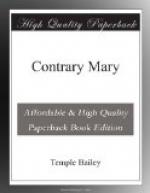Isabelle, straining her ears to hear what it was all about, asked Mary, late that night, “What upset Frances at dinner?”
Mary told her.
“Do you think I’m wrong, Aunt Isabelle?” she asked.
The gentle lady sighed, “If you feel that it is right, it must be right for you. But you’re trying to be all head, dear child. And there’s your heart to reckon with.”
Mary flushed “I know. But I don’t want my heart to speak—yet.”
Aunt Isabelle patted her hand. “I think it has—spoken,” she said softly.
Mary clung to her. “How did you know?”
“We who have dull ears have often clear eyes—it is one of our compensations, Mary.”
CHAPTER XVII
In Which an Artist Finds What All His Life He Has Been Looking For; and in Which He Speaks of a Little Saint in Red.
It might have been by chance that Delilah Jeliffe driving in her electric through a broad avenue on the afternoon following the christening of Constance’s baby, met Porter Bigelow, and invited him to go home with her for a cup of tea.
There were certain things which Delilah wanted of Porter. Perhaps she wanted more than she would ever get. But to-day she had it in her mind to find out if he would go with her to the White House garden party.
Colin Quale was little and blond. Because of his genius, his presence had added distinction to her entrances and exits. But at the coming function, she knew that she needed more than the prestige of genius—among the group of distinguished guests who would attend, the initial impression would mean much. Porter’s almost stiff stateliness would match the gown she was to wear. His position, socially, was impregnable; he had wealth, and youth, and charm. He would, in other words, make a perfectly correct background for the picture which she designed to make of herself.
The old house at Georgetown, to which they came finally, was set back among certain blossoming shrubs and bushes. A row of tulips flamed on each side of the walk. Small and formal cedars pointed their spired heads toward the spring sky.
In the door, as they ascended the steps, appeared Colin Quale.
“Come in,” he said, “come in at once. I want you to see what I have done for you.”
He spoke directly to Delilah. It was doubtful if he saw Porter. He was blind to everything except the fact that his genius had designed for Delilah Jeliffe a costume which would make her fame and his.
They followed him through the wide hall to the back porch in which he had set up his easel. There, where a flowering almond bush flung its branches against a background of green, he had worked out his idea.
A water-color sketch on the easel showed a girl in white—a girl who might have been a queen or an empress. Her gown partook of the prevailing mode, but not slavishly. There was distinction in it, and color here and there, which Colin explained.




